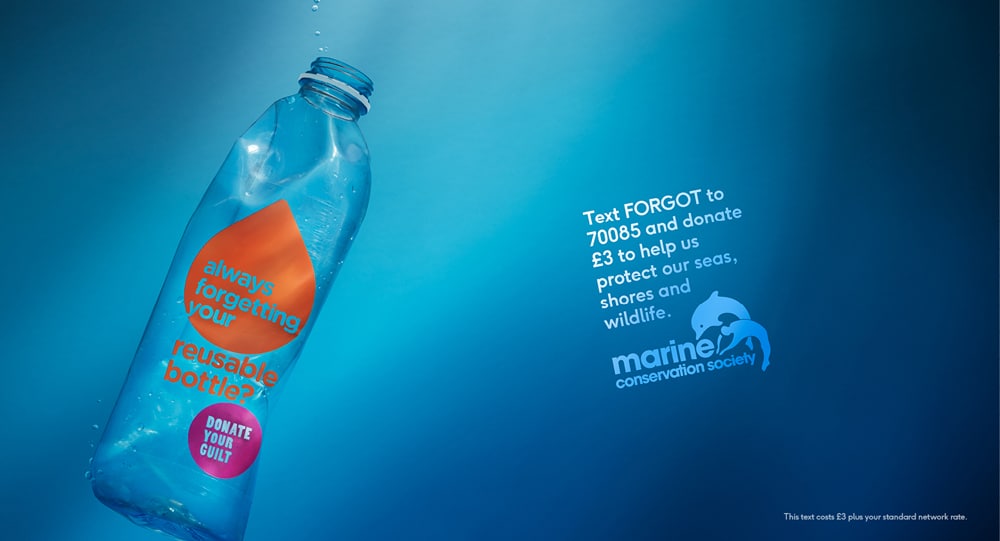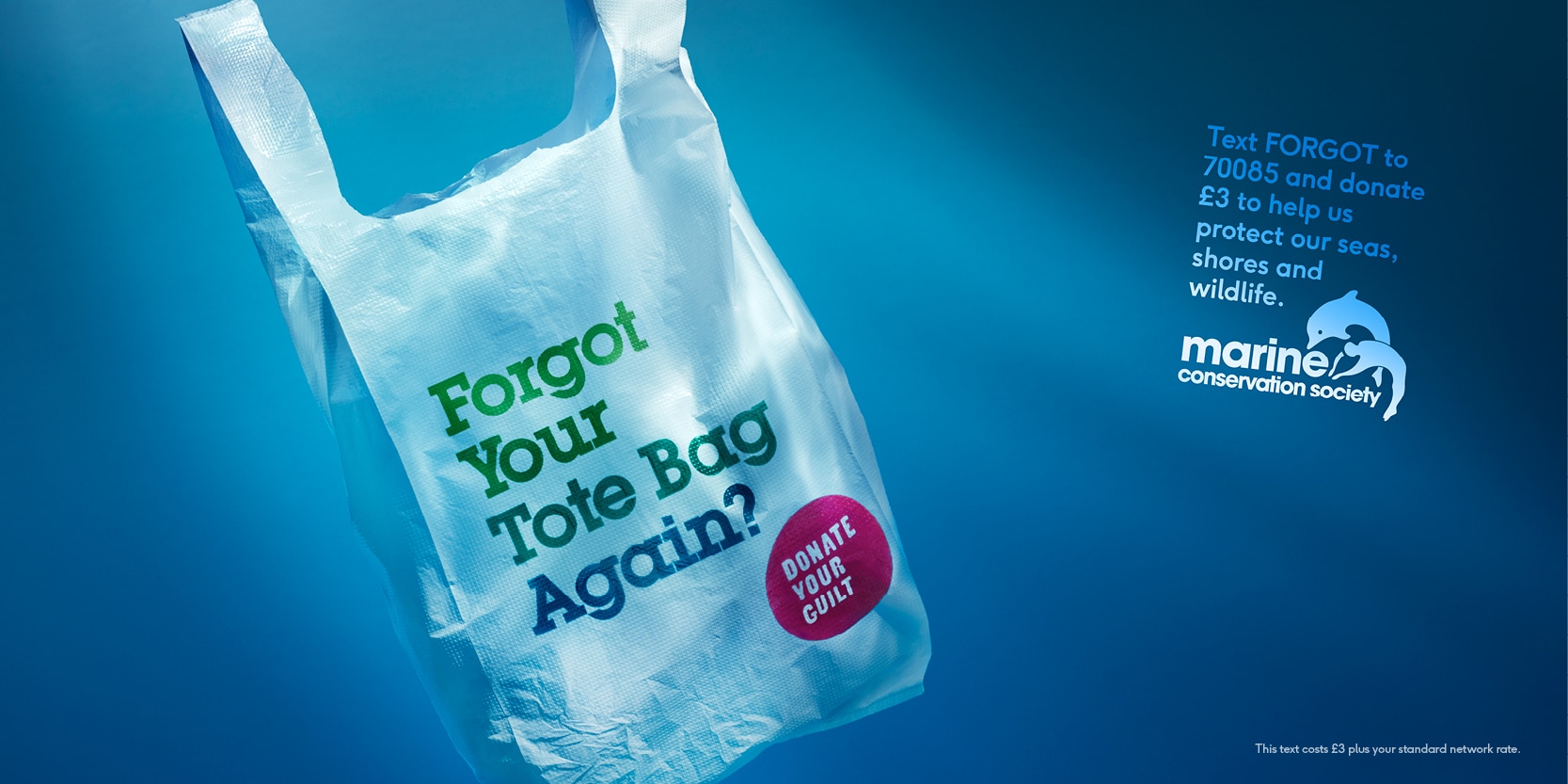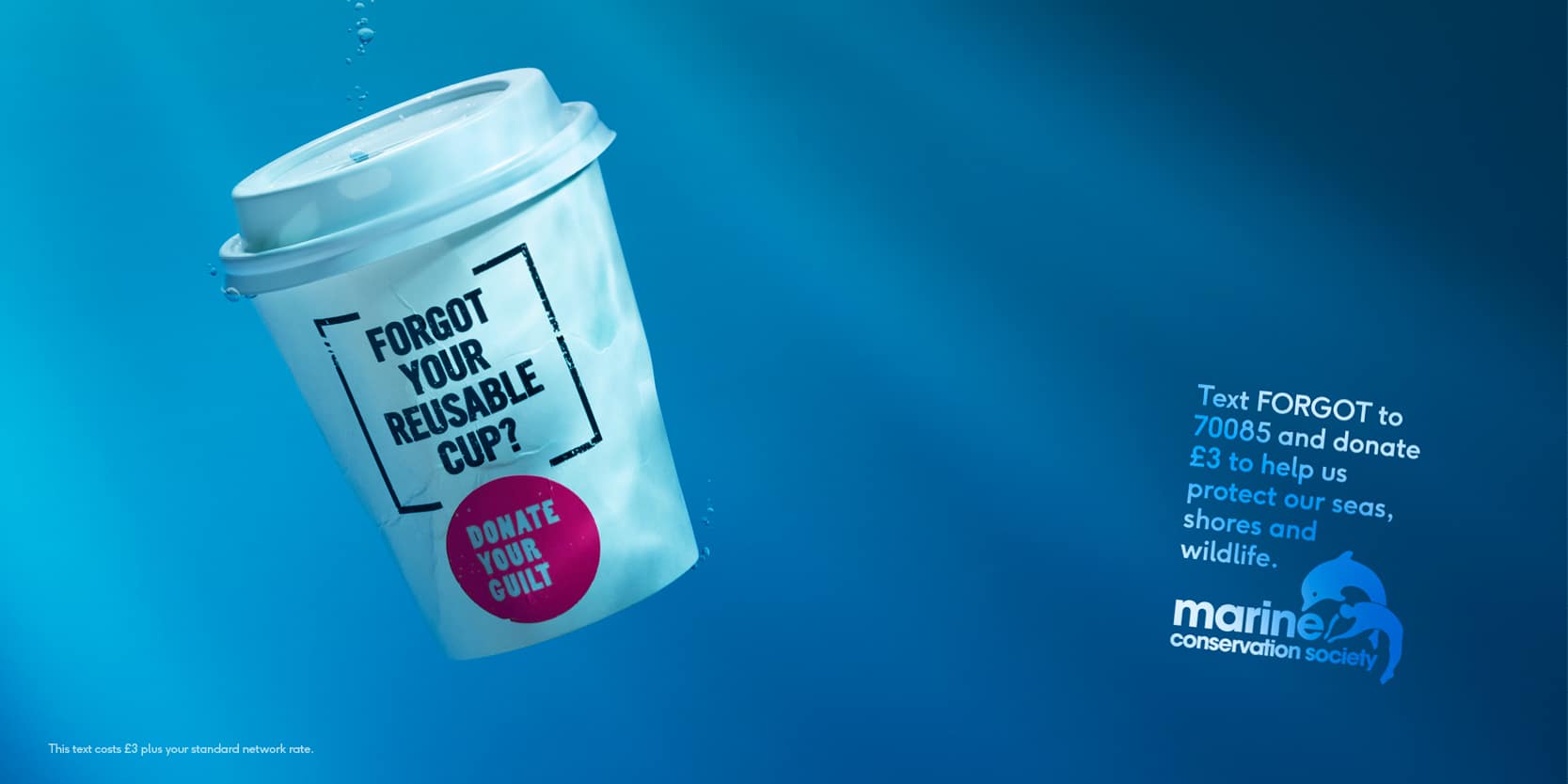Marine Life & Conservation
Donate Your Guilt!

 The Marine Conservation Society’s ‘swear box for the oceans’ reminds consumers to think twice before purchasing single-use plastic items
The Marine Conservation Society’s ‘swear box for the oceans’ reminds consumers to think twice before purchasing single-use plastic items
A powerful new campaign has been launched inviting people to donate to the UK’s leading marine charity every time they forget their reusable bags, bottles and coffee cups.
The Marine Conservation Society (MCS) wants people across the UK to remember never to leave home without their re-usable mugs and bags, rather than buying single-use plastic which then ends up in our ocean.
The campaign was dreamt up by creative agency BBH on a pro-bono basis, made possible by Ocean Outdoor, who have pledged support to MCS over the next three years. The adverts –which will run across social media and on Ocean Outdoor billboards across the UK including Westfield London, Bullring Birmingham and Manchester and Edinburgh city centres and on social media – cleverly feature single-use items floating in water, including an old plastic bag, a takeaway plastic coffee cup, and a small plastic water bottle.
The ads urge people to “Donate your Guilt” with a £3 text donation to the charity, which works tirelessly to protect our seas and oceans and runs the hugely popular citizen science survey, the Great British Beach Clean, every year.
The thought-provoking campaign is not designed to let people off the hook when they forget their re-usable items, but to encourage societal and behavioural change in reminding people not to buy single-use plastic every day if they can avoid it.
MCS Director of Fundraising and Marketing, Mike Crossley said: “This is our swear box for the oceans. We want to help change people’s habits. We think that asking people for a small donation when they’re feeling guilty will help them remember the next time they leave home.”
“We want people to ditch single-use plastic so that it doesn’t end up littering our beaches and polluting our waterways. We want people to remember their re-usable mug when they buy their morning coffee, to carry their water bottle with them rather than buying a single-use plastic bottle for those thirsty moments, and to remember their tote bag when they buy their groceries.
“What better way to get us all to remember the cost to the environment of unnecessary plastic, than by making us think through our purses and wallets. We all feel a bit guilty when we forget our re-usable bags, bottles and mugs, but we are all human – even the most committed of us slip up sometimes.”
MCS has run a series of highly successful campaigns in recent years which have led to policy changes by governments across the UK. The charity called for a plastic bag charge to discourage single-use plastic bag usage and led calls for a money-back recycling system – known as a Deposit Return Scheme (DRS) – for glass and plastic drinks bottles and cans which is being introduced in Scotland and is currently under consideration in England, Wales and Northern Ireland.
Jon Peppiatt, Chairman at BBH, said: “We have been very happy to give our time to help MCS with this campaign. It’s such an important issue that I believe we all care about but we need to do more, hopefully this work will help change some behaviours and make a difference.”
Crossley added: “As a charity, we and our volunteers dedicate our time to cleaning up and protecting our beaches, seas and wildlife. We hope our campaign will have an impact on people’s behaviour in a way which will have a lasting impact and at the same time will allow us to continue our work through valuable donations.”
For more information about the Marine Conservation Society please visit their website by clicking here.
Marine Life & Conservation
Paul Watson Released as Denmark Blocks Japan’s Extradition Bid

Renowned anti-whaling activist Paul Watson has been released from custody in Greenland after spending five months in detention. Denmark’s Justice Ministry rejected Japan’s request for his extradition, citing insufficient guarantees that his time already served in custody would be credited against any potential sentence.
The 74-year-old Canadian-American was arrested on July 21 in Nuuk, Greenland’s capital, when his ship docked to refuel. His arrest was based on a 2012 Japanese warrant related to a 2010 encounter in Antarctic waters. Japan alleged Watson obstructed operations and caused damage to a whaling research ship during efforts to disrupt illegal whaling. Watson has consistently denied these claims, maintaining his commitment to marine conservation.
Denmark, which oversees extradition matters for Greenland, concluded that while the legal conditions for extradition were met, the lack of assurances from Japan regarding time-served credit made extradition untenable.
In a video shared by his foundation, Watson expressed gratitude and relief, saying, “After five months, it’s good to be out… and good to know they’re not sending me to Japan.” He added that the most difficult part of his time in custody was being separated from his two young sons.
Watson is a pioneering figure in marine conservation, known for founding the Captain Paul Watson Foundation in 2022 after decades of activism with the Sea Shepherd Conservation Society. His bold efforts to defend marine life have earned him widespread support, including from celebrities and conservationists. His work has also been featured in the acclaimed reality TV series Whale Wars.
Watson’s lawyer, Jonas Christoffersen, praised the decision, stating, “We are happy and relieved that Paul Watson is now free.” He added that Watson is eager to reunite with his family and continue his vital work.
The arrest occurred while Watson’s vessel, the M/Y John Paul DeJoria, was en route to the North Pacific with a team of 26 volunteers to intercept a Japanese whaling ship. His foundation described the arrest as politically motivated and emphasized that Watson’s actions were focused on ending illegal whaling practices.
Japan resumed commercial whaling in 2019 after leaving the International Whaling Commission, asserting that whale meat is a cultural tradition. Conservationists, however, continue to challenge these practices, highlighting their impact on marine ecosystems.
Despite the challenges, Watson remains steadfast in his mission to protect marine life and bring attention to whaling practices. His dedication to ocean conservation has made him a globally respected advocate for the environment.
Marine Life & Conservation
12 Days of Zero-Waste Fish-mas

This holiday period, the Marine Conservation Society, the UK’s leading ocean membership charity, invites you to make some simple changes to eating fish this Christmas to help our seas.
Dr Kenneth Bodles, Head of Fisheries and Aquaculture at the Marine Conservation Society, said, “During the festive season, our consumption increases, but so does waste. Sustainability isn’t just about where food comes from – it’s also about how you use it. By reducing waste and making the most out of your seafood, you’re not only taking steps to be more ocean-friendly, but can also help to cut costs during what is often one of the most expensive times of the year”.
The Marine Conservation Society has compiled twelve tips on how to consume seafood sustainably with zero-waste this Christmas:
Buy whole fish instead of fillets
Instead of fillets, consider buying whole fish such as salmon, hake, or lemon sole. By adopting a “nose to tail” approach with cooking, whole-baked fish not only feeds a crowd, but also helps to minimise waste and maximise sustainability by using up every part of the animal, including bones, skin, and fat.
Make fish stock
Leftover fish bones or shells can be put to good use by boiling them to make a nourishing fish stock or bisque. This can be frozen and preserved for later use and makes for a flavourful base in a soup.
Make your own fish pâté
Avoid waste by turning leftover fish, such as smoked mackerel or salmon, into a delicious pâté by blending with cream cheese and lemon. Perfect when paired with crackers.
The sustainability of salmon and mackerel varies depending on where and how it is caught or farmed. For more information on green-rated options, check the charity’s Good Fish Guide.
Buy frozen
By purchasing seafood that is frozen or vacuum-packed, this helps to reduce waste by extending the shelf life of your food.
Fish pie
If you’re wondering what to do with leftover cooked fish, why not opt for a classic fish pie with mashed potatoes, leeks, and a cheesy sauce? A sure crowd pleaser on Boxing Day.
Use the head
Don’t forget the fish head! The meat is incredibly tender and flavourful. The charity recommends a cod’s head curry or recreating Fallow’s renowned cod’s head in siracha butter.
By stretching your ingredients further, not only is this a more sustainable way to enjoy seafood, but also cost-effective by repurposing leftovers and cooking creatively.
Boxing Day brunch
Mix leftover kippers or smoked salmon with scrambled eggs for a tasty, zero-waste, Boxing Day brunch.
For best choice, make sure you buy kippers, or herring, from the North Sea and the North Irish Sea.
Zero-waste storage
A top tip from the Marine Conservation Society to avoid waste is freezing fish offcuts to save for future use.
Crisp up the skin
Even leftover fish skin can be turned into a quick savoury snack by crisping it up in an air fryer with a little olive oil and salt.
Anchovies two ways
Leftover anchovies can either be blended with butter to make a delicious anchovy butter or tossed into pasta for a hit of umami flavour.
The charity recommends opting for anchovies caught in the Bay of Biscay for best choice.
Fishcakes
For an easy, zero-waste meal, leftover seafood trimmings can be mixed with mash and fried in breadcrumbs to make fishcakes.
Pickled mussels
Try pickling mussels in 1:1 vinegar and water, with a dash of sugar for a sustainable, zero-waste snack that can be enjoyed well beyond the festive season.
Mussels farmed in the UK are a seafood superhero. Grown using low-impact methods and harvested by hand, they get all the food they need from the sea around them. This makes them one of the most sustainable, ocean-friendly, and cost-effective seafood options.
Players of People’s Postcode Lottery have raised £6.6M towards the Marine Conservation Society’s vital work in making seafood more sustainable.
Laura Chow, Head of Charities at People’s Postcode Lottery, said: “Fish is a festive favourite for many, but making sustainable choices when it comes to how we buy and eat seafood makes all the difference for our ocean. Support from players of People’s Postcode Lottery has helped the Marine Conservation Society further its sustainable seafood work, so that we can all enjoy healthier, better protected seas.”
The Marine Conservation Society encourages you to make sustainable seafood choices a year-round habit, not just for Christmas. To check how sustainable the seafood on your plate is, you can visit the charity’s Good Fish Guide. The Guide helps consumers and businesses identify the most sustainable seafood using a simple traffic light system, based on where and how species are caught or farmed. Green is the best choice, amber means improvements are needed, and red indicates fish to avoid buying.
Zero-waste gift idea
Why not embrace a zero-waste Christmas by gifting a membership to support marine conservation? It’s a meaningful, low-waste gift that helps protect our ocean for generations to come. Memberships start from as little as £5 a month – the price of a sandwich and drink from your local coffee shop.
Find the latest sustainable seafood advice for wild-caught and farmed seafood on the Good Fish Guide, downloadable to your phone from www.mcsuk.org/goodfishguide.
-

 News3 months ago
News3 months agoIconic SS United States to become the World’s Largest Artificial Reef
-

 Blogs2 months ago
Blogs2 months agoScubaverse Christmas Gift Guide 2024: Day 4
-

 News2 months ago
News2 months agoSanta Divers take the Plunge for Charity
-

 Blogs2 months ago
Blogs2 months agoScubaverse Christmas Gift Guide 2024: Day 1
-

 News3 months ago
News3 months agoDiscover Turquoise Divers and Media Luna Beach & Dive Resort: A Premier Diving and Relaxation Destination in Roatan
-

 Blogs2 months ago
Blogs2 months agoScubaverse Christmas Gift Guide 2024: Day 5
-

 Blogs2 months ago
Blogs2 months agoScubaverse Christmas Gift Guide 2024: Day 2
-

 News3 months ago
News3 months agoToucan Diving at Plaza Beach and Dive Resort Bonaire Introduces PADI Mermaid Training





